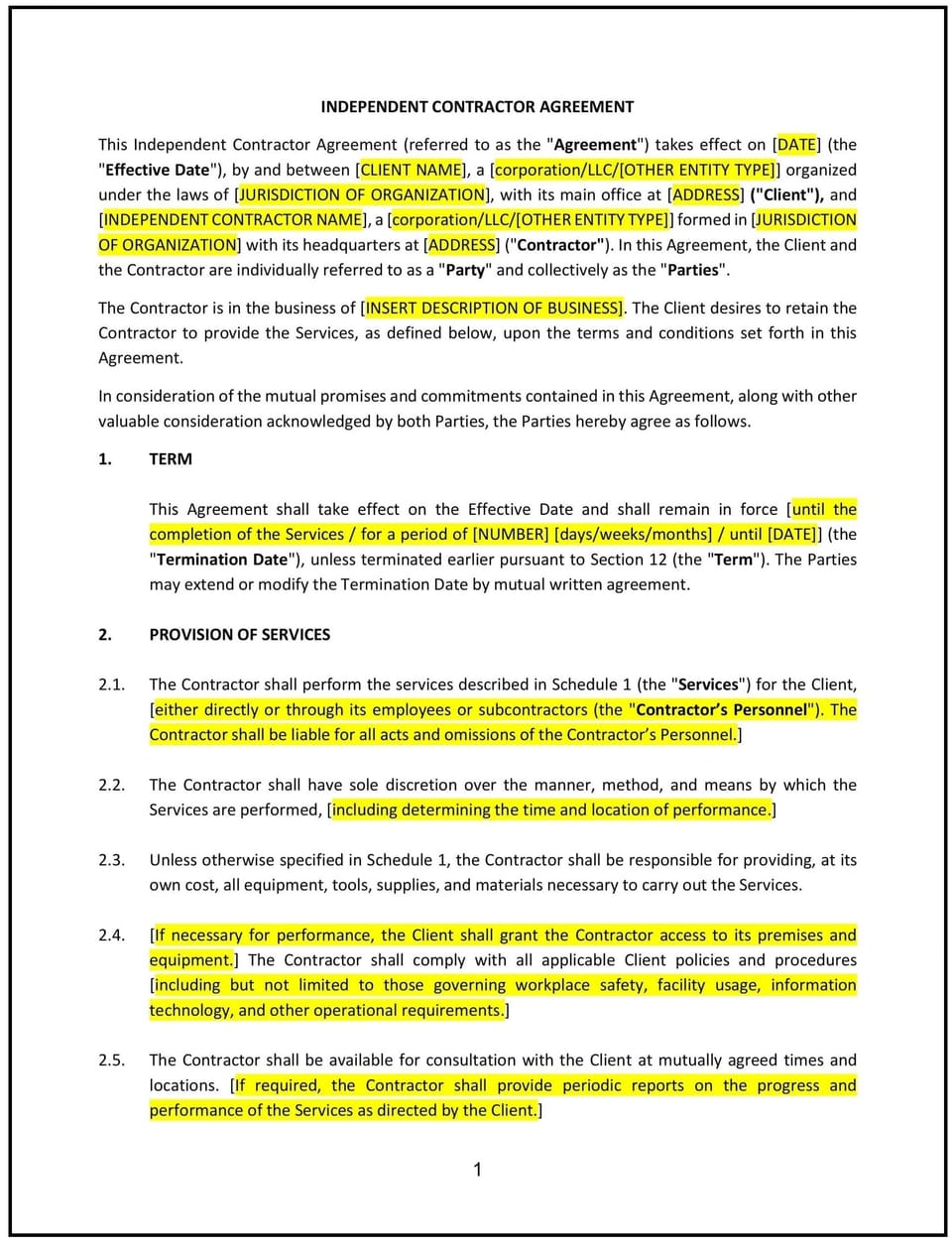Independent Contractor Agreement (California): Free template

Independent Contractor Agreement (California)
An Independent Contractor Agreement in California is a legally binding contract that defines the relationship between a business and an independent contractor. Unlike employees, independent contractors operate as self-employed professionals responsible for their own taxes, insurance, and work expenses. This agreement helps businesses establish clear expectations while ensuring compliance with California’s strict worker classification laws.
California has some of the most stringent regulations regarding independent contractor classification, primarily under Assembly Bill 5 (AB 5) and the ABC test. Under this law, most workers are presumed to be employees unless the hiring entity can prove:
- The worker is free from the control and direction of the hiring entity in performing the work.
- The worker performs work outside the usual course of the hiring entity’s business.
- The worker is engaged in an independently established trade, occupation, or business.
Many industries in California, including technology, consulting, creative services, and construction, rely on independent contractors for specialized work. However, misclassification can result in significant penalties, back taxes, and legal action. This agreement helps businesses document contractor status while protecting both parties from potential disputes.
Tips for drafting and maintaining an Independent Contractor Agreement in California
- Clearly outline the scope of work, including specific deliverables, deadlines, and performance expectations to avoid disputes.
- Define payment terms, including invoicing procedures, rates, payment schedules, and penalties for late payments. California law requires businesses to pay independent contractors according to agreed terms.
- Include a contractor status clause affirming that the contractor is not an employee and meets the requirements under California’s AB 5 and the ABC test.
- Protect confidential business information by incorporating non-disclosure clauses. California law allows enforceable NDAs, but they must be specific and reasonable in scope.
- Clarify intellectual property ownership, particularly for creative or technology-related work, to determine whether the hiring business or the contractor retains rights to any work product.
- Establish a dispute resolution process, specifying whether conflicts will be handled through California courts, arbitration, or mediation. California generally favors arbitration clauses, but they must be carefully drafted to comply with state laws.
Frequently asked questions (FAQs)
Q: What should California businesses include in an Independent Contractor Agreement?
A: The agreement should define the scope of work, payment terms, liability limitations, confidentiality obligations, and contractor status to help meet state classification standards.
Q: How does an Independent Contractor Agreement benefit businesses in California?
A: It provides a structured legal framework that helps businesses comply with AB 5 and reduce the risk of worker misclassification claims.
Q: Can a California business control how an independent contractor works?
A: No, businesses can set deadlines and work quality expectations, but contractors must have control over how they perform the work to maintain their independent status under the ABC test.
Q: How does California determine if a worker is an independent contractor?
A: California uses the ABC test under AB 5, which evaluates control over the worker, whether the work is outside the usual business activities, and whether the worker is engaged in an independent trade.
Q: Are non-compete clauses enforceable in California independent contractor agreements?
A: No, California law generally prohibits non-compete agreements, even in independent contractor relationships.
Q: How can businesses avoid misclassifying independent contractors in California?
A: Businesses should ensure that contractors have control over their work methods, operate independently, and provide services outside the core business functions of the hiring entity.
Q: What happens if an independent contractor claims they were misclassified as an employee in California?
A: The California Labor Commissioner or the IRS may investigate, leading to fines, back taxes, and potential legal liability for the hiring business.
Q: Are verbal Independent Contractor Agreements enforceable in California?
A: While verbal agreements may be legally binding, a written contract is strongly recommended to document the relationship and protect both parties.
This article contains general legal information and does not contain legal advice. Cobrief is not a law firm or a substitute for an attorney or law firm. The law is complex and changes often. For legal advice, please ask a lawyer.


